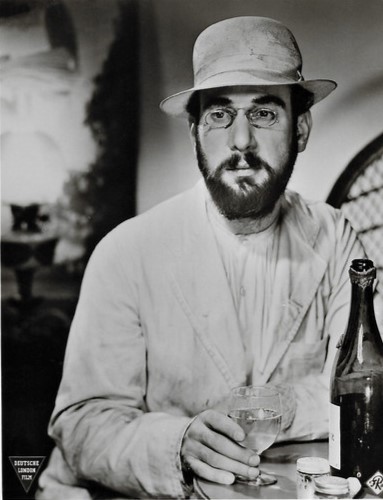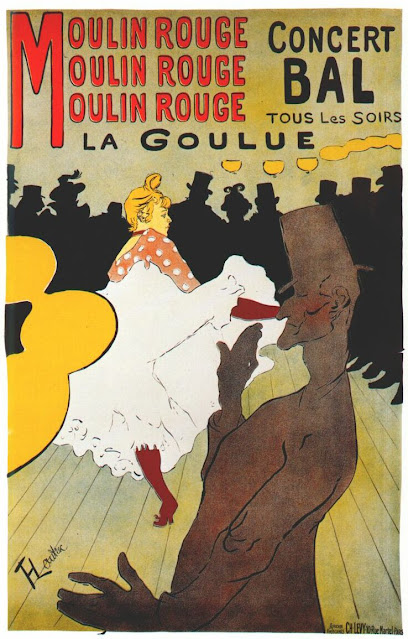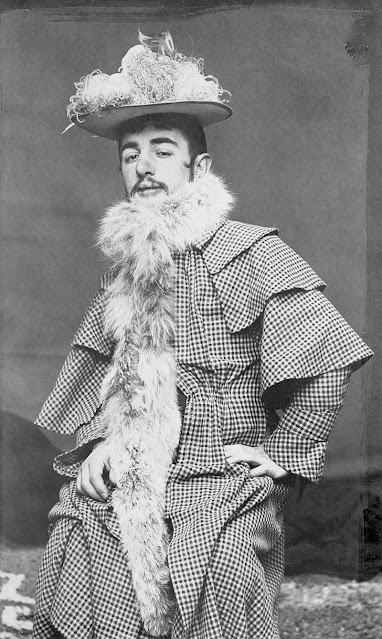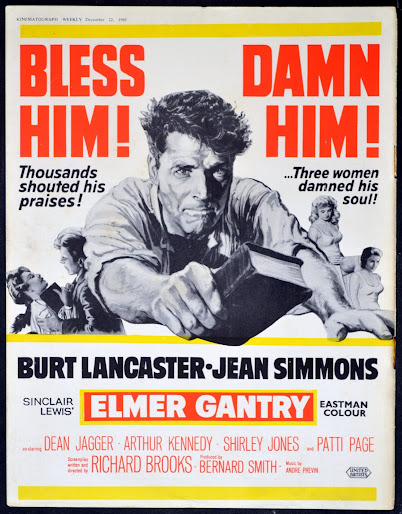I watched the movie long before I knew very much about the man. But as with that other painter-of-the-people, Van Gogh, Lautrec's artworks are - what? Just around, everywhere. It's fashionable to hate the Hollywood versions of great artists (Lust for Life, which I really love, is universally loathed among art snobs), but to tell you the truth, I think Ferrer comes closer to becoming Lautrec than any other actor could, or should even try to.
Wednesday, July 23, 2025
Lost in Lautrec: why Jose Ferrer was the best Toulouse
Toulouse, Toulouse! Why do I feel that I know you?
He'd make fun of himself, cut ahead of the line, and get the jabs in before anyone else could take a stab.
Tuesday, July 22, 2025
Space Cats — Magic Fly
Sunday, July 20, 2025
Mushmouthed English: Why does everyone sound like Sean Connery now?
Tuesday, July 15, 2025
Today, all I want to do is watch 7 hours of drive-in intermission shorts!
Friday, July 11, 2025
BETRAYED: A Story of Religious Abuse
This little clip from YouTube claims to be a story of fraud, betrayal and abuse of power. And ironically, it turned out that way after all.
The result of not knowing anything about his past is that we felt alone with the chaos, and (as he kept telling us) somehow responsible for it. We had to try to chop our way through the incredible wilderness of fraud, damage and shattered trust he had created in a stable, longstanding congregation in just a few months.
When the whole thing finally blew up and the larger body of the church investigated and then "dismissed" him (sound familiar?), the congregation floundered badly after that, and never did recover.
He made several trailers for it, with different titles according to what he saw as trendy at the time. As you can see from the clip, he had a ready explanation for the disaster of his ministry: his African culture had been cruelly rejected by a bunch of comfortable, well-off white people! We did, for the most part, fit that last description, but what dismays me even more is the fact that what happened to us is hardly rare. It's just that no one talks about it, seemingly embarrassed about the fact that they had been "taken". Or, are they protecting certain people, and not others?
But this sort of spiritual abuse is so common now that I seem to see it every day: religious corruption in one form or another. And it is particularly bruising when it happens, not on the stage of a massive megachurch, but within the walls of a very small church which was looking forward to a fresh start in their ministry, and instead were permanently disabled and never found their way back.
Wednesday, July 9, 2025
Bless him! Damn him! It's Elmer Gantry
Though this started off paranthetical, I want to devote a whole post to yet another movie I re-watched for the first time in at least 30 years - Burt Lancaster's brilliant tour-de-force as a creepy, fake evangelist in Elmer Gantry. Not only did this movie exceed all my extremely high expectations, but I think I had goosebumps for a solid two hours, not just because of the electrifyingly charismatic (and sexy) main character but because every single performance in this thing was so note-perfect, with NOT ONE miscast actor even in the smallest role. Even the characters with no speaking parts were anything but furniture - they all knew what they were supposed to be doing as part of the scene. The directing was tight and dynamic, the music as fierce and compelling as Lancaster himself, and the script - let's just say it all worked.
It worked for me personally because since the last time I saw it in the '90s, I lived through a horrible church scandal in which the congregation completely fell for a charismatic fake who basically destroyed the foundations of the church in a single year. And he wasn't even sexy like Burt! But it was more than that. Gantry was not just a shallow creep. Lancaster knew how to act using his eyes, his hands and face and voice, and at times he expressed a real tenderness towards Sister Sharon and even the prostitute who tried to frame him. Gantry had levels. He had wanted to be a minister of the Gospel himself, and failed due to his inability to live within the rules. So was it really coincidence that drew him back to the revival tent? Why did he fall so hard for Sister Sharon, literally at first sight? In some part of himself, did he think he could start all over again, and this time get it right? There was more than a trace of conscience in Gantry, and even though he was practiced in ignoring it, we could see it peeping through. How the hell did he manage that?

There's stuff going on here, so layered, so levelled and striated, that we can't possibly take it all in. I could watch it ten more times and still have goose bumps. Gantry was made in 1960, and received all the accolades it could possibly receive, including an Oscar for Lancaster, who claimed that Gantry was really just a version of himself. That does NOT mean it was an easy role to play - playing yourself can be excruciating, as Marlon Brando was to discover when he publicly gutted himself in Last Tango in Paris. He needed to go into therapy to recover.

True, they don't make them like that any more, and I am not the only one who feels this way. Can I name even one actor who comes close to Simmons or Lancaster, not to mention poor old Monty Clift? Even 30 years ago, real acting genius was disappearing, replaced by the cult of personality. The problem is, you can't smell an actor any more, because no one has the chops. Which is why I have pretty much stopped going to the movies, and why I keep on tuning in to Turner Classics to see pictures which SURELY won't be as superb as I remember. Or not? In this case, Elmer Gantry was like the scene at the very beginning, in which Sister Sharon sees a shooting star - blazing and all too fleeting, but burned into your eyelids through sheer incandescence.
Monday, July 7, 2025
When a good movie turns bad: how many times is this going to happen?
It's a period piece, of course, but it's all very '90s, and even though it was meant to represent deepest antiquity, it just felt dated. For one thing, Day Lewis was probably way more boring than Winona, who actually came across as the most subtle, best-realized character. Michelle Pfeiffer was so unappealing, not just physically unattractive but abrasive and particularly un-charming and un-seductive, that the whole thing just didn't come off, any more than her tight Victorian corset and elbow-length gloves were going to come off.
I hate to have to say it, but I'll say it - Day Lewis came across as so passive and repressed that he bored me to tears. You can overdo the repressed thing to the point of coma. He even seemed effeminate to me, a word we aren't supposed to use any more - but what I mean is, there was absolutely zero sexual spark between the two of them. Nothing. Pfeiffer seemed cold and superficial, her flirting seemed like an actual effort (I got so sick of her thrusting her hand out at men so they were forced to kiss it), and if Day Lewis would JUST get that moony-calf look off his face. . . Was there any sexual tension there at all? Did there need to be?
Part of it was just the wild popularity of these actors at the time, which must have had a huge effect on casting. Well, we COULD get this-or-that actor or actress, but Michelle Pfeiffer just had a huge hit with (insert title of hit), and wouldn't she be a bigger draw? And as I study the so-called Golden Age of movies more closely, I realize how dicey casting can be,with a dozen actors turning down a role, maybe because their agents warned them against it (or they wouldn't be paid enough), or a thousand other actors auditioned for the role and were rejected. So exactly who gets the gig?
You weren't supposed to criticize Day Lewis back then, because he wasn't just an actor. He was an ECK-TORRRR. He was kind of like Montgomery Clift, in that even with Liz Taylor he had to fake sexual arousal. He was best buds with Liz, and it showed in the lack of passion in their scenes in A Place in the Sun and Raintree County. It just wasn't there.
Do we hear of Day Lewis now? Was his middle name really "Day", or was that just an affectation to save him the embarrassment of being plain old Daniel Lewis? Who'd remember THAT? And how dull would it look on the marquee?
It would be interesting to actually sit down with my favorite movie Mafioso and get Marty's honest take on what Lewis (LEWIS) was actually like to work with. He'd likely praise him to the skies, because that's what you were supposed to do back then.There were certain movie icons that weren't to be criticized. Meryl Streep was an untouchable goddess back then, no matter how pretentious, mannered and even ludicrous her portrayals were. This was brought home to me recently by her narration of Eleanor Roosevelt's voice in the PBS series I just re-watched. It was just a caricature, a cartoonish take on the somewhat William Shatner-esque halting quality of her speech. Unfortunately, there were a lot of voice clips of the real Eleanor in the last episode, and it became obvious that the halting quality only showed up very late in her life, as it often does in older people (excuse. . . me. . . yes. . . ). But she sounded like a querulous old lady when she was supposed to be 20 years old.
Why does bad acting get so richly rewarded, leading to such astonishing blunders in casting? I don't go to movies any more because I am not interested in YET ANOTHER SUPERMAN MOVIE (or movies based on stupid video games or whatever other junk). Sometimes I miss those long commutes into Vancouver, mostly the anticipation of seeing something worth the trudge - but I have to tell you, quite often the popcorn was the best part.
So why did I have such a different opinion of this movie 30-some years ago? It's the usual thing - I'm way different than when I was a mere child of 40. I've seen a lot, lived, loved, lost (etc. etc. - all the rest of it). But a lot of it comes down to the radical change in pop culture. It's almost unrecognizable now. Either Daniel Day Lewis (or Danny Lewis) has died and I don't realize it yet, or he has retired because he's too ugly like Jack Nicholson, or suffereng from dementia (and how many actors seem to have dementia, these days?), or just got fed up with trying to pretend he was sexually attracted to cold, charisma-less actresses in parts for which they were woefully miscast.
Saturday, July 5, 2025
So why did I watch Taxi Driver - again??

A little Italian let’s praise today:
The Topo Gigio of pictures, let’s say.
When Taxi Driver comes on TV,
I always drop what I’m doing, you see,
For Travis Bickle is my main man,
Because of DeNiro I’m such a great fan.
When first I saw this story bleak,
I had to through my fingers peek,
For though the end was a gory mess,
I couldn’t stop watching, I must confess.
Then I saw a picture of Marty,
Who supports the Italian Munchkin party.
Like my Uncle Aubrey his eyebrows were dense,
And his movies didn’t always make much sense.

But to the soul they spoke without fail,
For Raging Bull's a morality tale.
And fluids red from DeNiro’s face
Went gushing and flying all over the place.
When we saw Jake LaMotta bash his head,
It filled us all with horror and dread.
But for our director, comedy was king,
For sociopaths were Marty’s favorite thing.
I can’t tell you all the movies he did,
For I’d be here all day, I do not kid.
But some of them were a big surprise,
Like Age of Innocence, pure sex in disguise.

And "Alice" by Bursteyn, my what a trick,
For feminist views he laid on quite thick.
And when he did that movie of Jesus,
He went far out of his way to please us.
Then there was Goodfellas, my what a pic,
And I can’t say it was my favorite flick.
Every time I try to watch this thing,
It doesn’t exactly make me sing.
No, there’s pictures where human flesh does rip,
And he and DeNiro seem joined at the hip.
It’s an odd sort of duo, a big guy and small,
With both of them Cosa Nostra and all.
Real genius is rare, so let's praise this guy,
And hope that his pic on Sinatra will fly.
His turkeys are few, though with Liza Minnelli
He went on a coke binge and turned into jelly.

Martin Scorsese, Martin Scorsese,
Your pictures are great and drive film students crazy.
So some day I hope, in my brief mortal span
I can call you just Marty: cuz you is de man!
Thursday, July 3, 2025
THE ROOSEVELTS: Twelve years on, did the series change, or did I?
After hugely enjoying the first few episodes, I did finally watch the end of the 2013 PBS series, The Roosevelts, and oh it was hard going. Very well done, but tedious in places, and sort of depressing due to the heavy subject matter and what happened to all of them. Both TR and FDR died at around age 60, completely used up physically and mentally, and it was hard to watch.
I never liked FDR and saw him as pretentious and superficial, and Eleanor, though you’re supposed to admire her, has an “ADMIRE ME” sign on her, and her querulous voice and matronly print dresses and constant, Roosevelt-esque smiling just irritated me. (They all had a smile that never seemed to leave their faces, replicated a generation or so later by the Kennedys, with their piano keys always on show). Meryl Streep did a parody of her, a Rich Little impression rather than an interpretation.
The first six hours (SIX HOURS!) were the best, and should have been a separate docuseries on TR. It would have been superb as a freestanding series, but it ranged too far and got bogged down. It was as if something changed halfway through, as if other people dominated the research, or the clips, or whatever. Changing horses mid-stream, as TR would no doubt put it.
So it was a bit of a trudge, but it was still better-made than almost any other doc series I've ever seen. I’m still interested in TR, and now have two other books that I hope don’t rip him apart or make him – incredibly! – DULL. The biographer I didn’t like (Brands) was used a lot in the doc, which surprised me and made me wonder if he also wrote other books about them. Maybe he liked FDR, and admired Eleanor as you are required to.
So. Now I have a long-awaited biography of Toulouse-Lautrec, but it’s challenging in a whole different way, SO detailed I wonder why on earth it all needs to be there. Surely the author can say “his mother took him to one health spa after another, with no results”, rather than recounting EVERY single health spa, EVERY useless treatment, etc. But it is interesting to see how positive he was, how almost sprightly, a satirist who wrote funny, pointed letters with tiny ink drawings in the margins, and arrogant in a way that was still kind of endearing. And I see virtually no self-pity in a man who had every reason to live in a state of despair.
Thursday, June 19, 2025
Why you should NOT overshare on the internet. . .
On the eve of my 62nd birthday, something of a re-birth announcement...
The mania I've been experiencing for the past few weeks continues. I am making every effort to recognize and do what I can to manage it, and with some success provided I stick to certain things. Among these: my online presence. It's become baldly obvious to me that I must reduce my internet activity considerably, and that's why I write to you all: if you're wondering how I'm doing, where I am, if I am, etc., it may take a day or two before you hear from me.
I'll spare you the thinking behind this -- god only knows, but makes sense to me -- but I also wanted to let everyone know that this is a struggle that I absolutely refuse to go through alone. And by that I mean going public. Once I am finally able to trust my thoughts again -- or even to corral them better -- I've got a plan.
I want to put this before everything. I want to re-emerge from this as a public activist. I've already got a semi-public profile, and it seems obvious and necessary that I try to harness this to my own recovery and public function. I know there's a book in this, but also a specialized website (under construction already), but possibly a documentary, podcast and as many public speaking opportunities as I can book.
I mean, who wouldn't want this: the world's first Bipolar standup addict terminally unfiltered movie critic?
See? This mania is K-razee.
Much love to y'all and more to come.
With my Sherlock mind, I couldn't leave it alone, and I did find a tweet (back when you could still read them without donating a few pints of your blood) which talked about how he was going to "recklessly" share his story of "multiple arrests", breaking sobriety, disturbing the peace, etc. etc. in an event called But That's Another Story. I didn't see this as an advocacy thing, but more of the "drunkalogue" syndrome you hear in AA - telling the same story endlessly, embellishing each time, and getting lots of laughs from the most painful experiences a human being can suffer.
The care and patience I received during my long night of gonzo batshit free fall was AMAZING. I regaled the cops who delivered me to psychiatric emergency — named, God love them, Scott and Geoff — with the dirtiest movie true life trivia I could — and boy did I. I was like the Groucho Marx of psychiatric emerg.
As I was escorting them out — until the psychiatric staff pulled me back inside — I tried to hug them, which they warmly refused. I offered a handshake, and Scott said “How about a fist bump, Geoff?”
And as for Jenn, the gorgeous and deeply empathetic psych muse, whom I fell deeply and obviously in love with inside of three seconds: thanks for the only memory of this whole shitshow that I cherish. That and Scott and Geoff’s fistbump.
So this is it, huh? Antidepressants smother my libido into perpetual remission, and if I get horny it means I’m about to smash my stall. How fucking fair is that?
Doughnuts. Now why didn’t I think of that when it might have helped?
Love and thanks.
Talk about a discussion starter. Veronica Liskova's affecting, disturbing and resolutely balanced portrait of a 'virtuous pedophile' cuts to the very heart of the idea of mental illness and social stigma. A documentary profile of a young man who maintains a clinically-assisted regimen of absolute sexual abstinence so as not to act on his desires, the movie not only ask us consider pedophilia as a form of treatable mental illness, but to consider what the real consequences of intolerance, ignorance and moral outrage are: that somebody like Daniel remains ashamed, in the shadows, and possibly poised to act out.




































.jpg)

.jpg)








